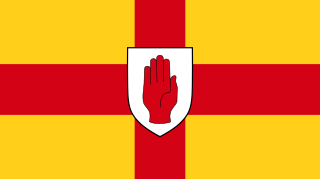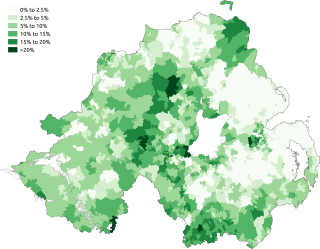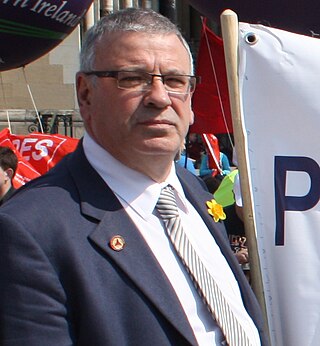Related Research Articles

Northern Ireland is a part of the United Kingdom in the north-east of the island of Ireland that is variously described as a country, province or region. Northern Ireland shares an open border to the south and west with the Republic of Ireland. At the 2021 census, its population was 1,903,100, making up around 3% of the UK's population and 27% of the population on the island of Ireland. The Northern Ireland Assembly, established by the Northern Ireland Act 1998, holds responsibility for a range of devolved policy matters, while other areas are reserved for the UK Government. The government of Northern Ireland cooperates with the government of Ireland in several areas under the terms of the Belfast Agreement. The Republic of Ireland also has a consultative role on non-devolved governmental matters through the British–Irish Governmental Conference (BIIG).

Ulster is one of the four traditional or historic Irish provinces. It is made up of nine counties: six of these constitute Northern Ireland ; the remaining three are in the Republic of Ireland.

The Ulster Unionist Party (UUP) is a unionist political party in Northern Ireland. The party was founded as the Ulster Unionist Council in 1905, emerging from the Irish Unionist Alliance in Ulster. Under Edward Carson, it led unionist opposition to the Irish Home Rule movement. Following the partition of Ireland, it was the governing party of Northern Ireland between 1921 and 1972. It was supported by most unionist voters throughout the conflict known as the Troubles, during which time it was often referred to as the Official Unionist Party (OUP).
Conradh na Gaeilge is a social and cultural organisation which promotes the Irish language in Ireland and worldwide. The organisation was founded in 1893 with Douglas Hyde as its first president, when it emerged as the successor of several 19th century groups such as the Gaelic Union. The organisation was a spearhead of the Gaelic revival and of Gaeilgeoir activism.

The Irish language is, since 2022, an official language in Northern Ireland. The main dialect spoken there is Ulster Irish. Protection for the Irish language in Northern Ireland stems largely from the European Charter for Regional or Minority Languages.
The Progressive Unionist Party (PUP) is a minor unionist political party in Northern Ireland. It was formed from the Independent Unionist Group operating in the Shankill area of Belfast, becoming the PUP in 1979. Linked to the Ulster Volunteer Force (UVF) and Red Hand Commando (RHC), for a time it described itself as "the only left of centre unionist party" in Northern Ireland, with its main support base in the loyalist working class communities of Belfast.

David Ervine was a Northern Irish Ulster Loyalist and politician who served as leader of the Progressive Unionist Party (PUP) from 2002 to 2007 and was also a Member of the Northern Ireland Assembly (MLA) for Belfast East from 1998 to 2007. During his youth Ervine was a member of the Ulster Volunteer Force (UVF) and was imprisoned for possessing bomb-making equipment. Whilst in jail he became convinced of the benefits of a more political approach for loyalism and became involved with the PUP. As a leading PUP figure, Ervine helped to deliver the loyalist ceasefire of 1994.

The Gaelic revival was the late-nineteenth-century national revival of interest in the Irish language and Irish Gaelic culture. Irish had diminished as a spoken tongue, remaining the main daily language only in isolated rural areas, with English having become the dominant language in the majority of Ireland.
Crumlin is a village in County Antrim, Northern Ireland.
Billy "Hutchie" Hutchinson is an Ulster Loyalist politician serving as the leader of the Progressive Unionist Party (PUP) since 2011. He was elected to Belfast City Council in the 1997 elections. Hutchinson was a Member of the Northern Ireland Assembly (MLA) for Belfast North from 1998 to 2003. He lost his assembly seat in 2003, and his council seat in 2005. He returned to the council in 2014 and was re-elected in 2019 though he later lost his seat in 2023. Before this he had been a member of the Ulster Volunteer Force (UVF) and was a founder of their youth wing, the Young Citizen Volunteers (YCV).

The ULTACH Trust is a charitable trust established in 1989 aimed at promoting the Irish language in Northern Ireland. Its former director was Aodán Mac Póilin and is now Róise Ní Bhaoill.

Hugh Smyth OBE was a Northern Irish politician who was leader of the Progressive Unionist Party. He was a former Lord Mayor of Belfast, as well as the longest-serving member of Belfast City Council, having first represented the Upper Shankill Road area in 1973. Smyth was awarded the Order of the British Empire in the 1996 New Year's Honours list.
Dawn Purvis is a former Unionist politician in Northern Ireland, who was a Member of the Northern Ireland Assembly (MLA) for Belfast East from 2007 to 2011. She was previously the leader of the Progressive Unionist Party (PUP) from 2007 to 2010.

Brian Ervine is a playwright, songwriter and teacher living in Belfast, Northern Ireland. The Northern Irish playwright St John Ervine (1883–1971) was a distant relative. In October 2010 he succeeded Dawn Purvis as the leader of the Progressive Unionist Party. Ervine's wife Linda serves as the Irish Language Officer at Turas, an Irish-language programme notable for its location in east Belfast.
The Caleb Foundation, created in 1998, is a creationist pressure group in Northern Ireland. It also lobbies on a range of social policy issues such as abortion and same-sex marriage from an evangelical Protestant perspective, and has been particularly influential with Democratic Unionist Party ministers in the Northern Ireland Executive. The organisation has described its mission as "promoting the fundamentals of the historic evangelical Protestant faith".
Ulster Protestants are an ethnoreligious group in the Irish province of Ulster, where they make up about 43.5% of the population. Most Ulster Protestants are descendants of settlers who arrived from Britain in the early 17th century Ulster Plantation. This was the settlement of the Gaelic, Catholic province of Ulster by Scots and English speaking Protestants, mostly from the Scottish Lowlands and Northern England. Many more Scottish Protestant migrants arrived in Ulster in the late 17th century. Those who came from Scotland were mostly Presbyterians, while those from England were mostly Anglicans. There is also a small Methodist community and the Methodist Church in Ireland dates to John Wesley's visit to Ulster in 1752. Although most Ulster Protestants descend from Lowland Scottish people, many descend from English, and to a lesser extent, from Irish, Welsh and Huguenots.
Linda Ervine MBE is a language rights activist from East Belfast, Northern Ireland. She is a speaker and supporter of the Irish language and is the project leader of the "Turas" Irish language project which "aims to connect people from Protestant communities to their own history with the Irish language". Turas is operated through the East Belfast Mission of the Methodist Church in Ireland. Ervine has gained some media attention because of her coming from a Protestant Unionist background and supporting an Irish Language Act.

The Identity and Language Act 2022 is an Act of the Parliament of the United Kingdom providing "official recognition of the status of the Irish language" in Northern Ireland, with Ulster Scots being an officially recognised minority language.
References
- ↑ "Linda Ervine: 'I don't want to be part of the problem in Northern Ireland'". Belfast Telegraph.
- ↑ Geoghegan, Peter. "Protestants go for Gaelic in Northern Ireland". Al Jazeera.
- ↑ "Irish Language Can Bridge Northern Irish Divide, Trinity Study Finds". The University Times.
- ↑ Ervine, Linda (26 March 2018). "Turas in east Belfast is now the largest provider of Irish classes in Belfast with the highest number of people registered. @ForasnaGaeilge".
- ↑ "TURAS at East Belfast Mission". East Belfast Mission.
- ↑ "Ervine relative speaks up for Irish". Belfast Telegraph.
- ↑ "About Us – Cairde Turas". Cairde Turas. Retrieved 26 September 2020.
- ↑ "New Irish language centre in Belfast". BBC News. 9 January 2014.
- ↑ "Language classes". Cairde Turas.
- ↑ McConville, Marie (9 August 2017). "Students who took Irish classes in loyalist area embark on university diploma as Gaeilge". Irish News. Retrieved 22 September 2019.
- ↑ "Protestants and Unionists from East Belfast learning Irish on the Dingle Peninsula". Radio Kerry. 31 August 2017.
- ↑ "Where the streets have both names - many east Belfast landmarks have long-forgotten Irish roots, as Ivan Little discovers on a bus tour". Belfast Telegraph.
- ↑ "Irish classes a success in Monkstown". Diocese of Connor. 29 April 2014.
- ↑ "Irish-Gaelic rebirth has Northern Ireland talking". The Globe and Mail.
- ↑ Monoghan, John (14 April 2017). "DUP MEP Diane Dodds met Irish language students during visit to east Belfast charity". Irish News. Retrieved 22 September 2019.
- ↑ "Visit our Irish class in loyal east Belfast... challenge to Orange chief who hit out at language". Belfast Telegraph.
- ↑ "Linda Ervine: 'Curry my yoghurt' pushed me towards Irish act". Belfast News Letter.